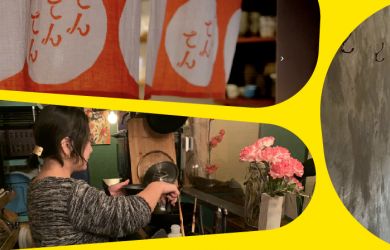
Originally published on metropolis.co.jp on July 2011

Not too many interview subjects tell you how to write your article. But then again, there aren’t many interview subjects who have a Bob Marley song named after their contribution to music culture.
DJ, filmmaker, and founder—along with The Clash’s Mick Jones—of influential post-punk band Big Audio Dynamite, Don Letts winds up our interview by instructing me to make my article like a Ramones song: “Hard and fast. Don’t have me going on and on,” he cautions.
It’s challenging to be brief about Letts’ many accomplishments. To begin with, he’s responsible for the “Punky Reggae Party”—the blending of punk and reggae in late 70s English rock—that Bob Marley enthused was “alright!” in his song of the same name.
Intriguingly, Letts had never DJ’ed in his life when he was asked to spin at the very first punk venue, the Roxy club. “My friend saw the response to the music I played at my shop, which was pure dub reggae,” Letts says down the line from his London apartment. “This was so early in the movement that there weren’t actually any punk records to play. So I played the records I liked, and lucky for me the punks liked it too.
“They liked the fact that the music was anti-establishment, and that the songs had a musical reportage quality,” he declaims with the air of a skilled raconteur. “They didn’t mind the bass lines obviously, as you’d later find out with bands like The Clash and Public Image Limited, and they loved the weed. So there was some serious cultural exchange going on, and that was a beautiful thing.”
It took the punks a few years to fully digest reggae. The purest expression of punk-reggae fusion is probably The Clash’s fourth album, 1980’s Sandinista! But after Mick Jones was booted from The Clash in 1983, he recruited Letts to further pursue the vision in the band that became Big Audio Dynamite.
Beginning with 1985’s This Is Big Audio Dynamite, the group explored not only the fusion of punk and reggae but also dance music, sampling and film—an amalgam that is now viewed as visionary.
“What happened was, Mick was out on tour with the Gorillaz, and that kind of whetted his appetite to be on stage again,” Letts explains of the reunion. “And there was a re-release of our very first album last year, which seemed to get people talking. I have to say it was more by the will of the people than a big check,” he quips.
The renewed interest in Big Audio Dynamite, who return to Japan for the first time in 18 years for a set at Fuji Rock, is part of a wave of fascination with ’80s bands that has been ongoing for a decade now.
“When we hit in the ’80s we were never that huge, I tell people we were ‘more cred than bread,’” says Letts, the child of Caribbean immigrants to the UK. “It’s interesting that history had almost written out BAD. The ’80s in the UK now means Duran Duran and all the synth bands… We attempted to merge Jamaican bass lines, New York beats, English rock guitar, and media elements to give it a fuller sound.”
The director of The Punk Rock Movie and the documentary The Clash: Westway to the World, Letts famously cannot play a musical instrument. His contributions came in the form of lyric-writing and film samples.
“I needed to justify my space in the band, so the first thing I did was to throw myself into sampling,” he explains. “We were one of the first acts to have a commercial hit with samples and dialog. I threw myself into that, but to be honest it wasn’t enough to justify my place in the band. So what I did was I took my film experience and put myself into lyric writing. The first song I ever wrote—with Mick’s guidance—was [hit] ‘E=MC2.’ I did four albums with BAD and co-wrote 50% of the songs with Mick—I’m happy with my part in the process.”
The BAD reunion tour has been a smash, selling out venues worldwide. But Letts is noncommittal on the future of the band. “I’d kind of resigned myself to a quieter life—each time I’m on stage looking at the audience I’m like—so, I’m in a band now?” he jokes.
“A new album would have to be at the call of the people,” he continues. “I would not like to outstay my welcome. If you’re lucky in life you get a window of opportunity, and you should use it to the best of your ability. But maybe then you should step aside and let someone else have a go.”
Fuji Rock Festival, July 29. See concert listings (popular) for details.





